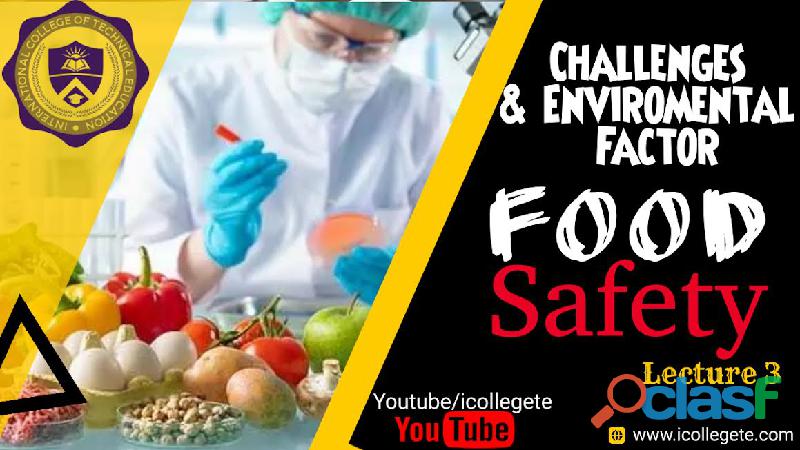NO 1 FOOD SAFETY LEVEL 1 COURSE IN GILGIT BALTISTAN IN RAWALPINDI
ICTE
International College of Technical Education.
Head Office :
Office # 27, Second Floor, Maryam Shadi Hall Plaza
(Airies Plaza), Shamsabad, Murree Road,
Rawalpindi, Pakistan 46000.
Email : info@icollegete.com
Contact : 051-8736681, 0311-5193625, 0092-335-4176949Food safety training courses are one of the best ways to gain the fundamental knowledge and skills required to handle food safely in a food business, some of which include: ... storing, preparing and cooking food correctly with regards to temperature, environment and equipment.Food Safety Training and Certification (FOSTAC) is an initiative by FSSAI whereby food safety trainings are conducted for target groups in the food business to maximise knowledge and awareness of food safety regulations and policies to ensure food safety and hygiene.Food safety and hygiene is of utmost importance for businesses, as it helps to protect the health of consumers from foodborne illnesses and food poisoning. Food poisoning occurs when food becomes contaminated by bacteria, viruses and other germs, making those who consume the contaminated food very ill.Prepare food, adhering to safety standards, by washing, chopping and monitoring while cooking. Maintain food-safety standards and maintaining a clean, safe work and dining environment. Prepared and cooked a variety of foods. Maintain sanitation, health, and safety standards in work area.Food safety training protects your customers from health risks. Providing adequate food safety training to everyone who handles food in your business is essential to protecting your customers from food poisoning, allergic reactions and other health risks that could occur from eating contaminated food.They are recognised by the Food Standards Agency (FSA) as suitable qualifications to deliver food official controls and will also enable you to become a Registered Food Safety Practitioner. Registered Food Safety Practitioners are accredited by CIEH and have passed a rigorous assessment of their skills and competence.
Basic sanitation principles, ways to apply the principles in practical situations, and methods for training and motivating food service personnel to follow good sanitation practices. Certification is awarded by the National Education Foundation of the National Restaurant Association upon successful completion of the national examination.
Course Learning Outcomes
1. Explain various types of food contamination and factors that contribute to foodborne illness
2. Identify the characteristics of potentially hazardous foods
3. Describe the dangers of foodborne illness
4. Identify the high risk population
5. Demonstrate the ability to explore and apply proper food handling techniques that will eliminate possible foodborne illness.
6. Demonstrate correct procedures for receiving, preparing, serving and storing food products
7. Identify food handler health problems that are a possible threat to food safety
8. Demonstrate proper personal hygiene procedures with regard to food handling
9. Demonstrate the ability to discuss the importance of food safety training in the workplace
International College of Technical Education.
Head Office :
Office # 27, Second Floor, Maryam Shadi Hall Plaza
(Airies Plaza), Shamsabad, Murree Road,
Rawalpindi, Pakistan 46000.
Email : info@icollegete.com
Contact : 051-8736681, 0311-5193625, 0092-335-4176949Food safety training courses are one of the best ways to gain the fundamental knowledge and skills required to handle food safely in a food business, some of which include: ... storing, preparing and cooking food correctly with regards to temperature, environment and equipment.Food Safety Training and Certification (FOSTAC) is an initiative by FSSAI whereby food safety trainings are conducted for target groups in the food business to maximise knowledge and awareness of food safety regulations and policies to ensure food safety and hygiene.Food safety and hygiene is of utmost importance for businesses, as it helps to protect the health of consumers from foodborne illnesses and food poisoning. Food poisoning occurs when food becomes contaminated by bacteria, viruses and other germs, making those who consume the contaminated food very ill.Prepare food, adhering to safety standards, by washing, chopping and monitoring while cooking. Maintain food-safety standards and maintaining a clean, safe work and dining environment. Prepared and cooked a variety of foods. Maintain sanitation, health, and safety standards in work area.Food safety training protects your customers from health risks. Providing adequate food safety training to everyone who handles food in your business is essential to protecting your customers from food poisoning, allergic reactions and other health risks that could occur from eating contaminated food.They are recognised by the Food Standards Agency (FSA) as suitable qualifications to deliver food official controls and will also enable you to become a Registered Food Safety Practitioner. Registered Food Safety Practitioners are accredited by CIEH and have passed a rigorous assessment of their skills and competence.
Basic sanitation principles, ways to apply the principles in practical situations, and methods for training and motivating food service personnel to follow good sanitation practices. Certification is awarded by the National Education Foundation of the National Restaurant Association upon successful completion of the national examination.
Course Learning Outcomes
1. Explain various types of food contamination and factors that contribute to foodborne illness
2. Identify the characteristics of potentially hazardous foods
3. Describe the dangers of foodborne illness
4. Identify the high risk population
5. Demonstrate the ability to explore and apply proper food handling techniques that will eliminate possible foodborne illness.
6. Demonstrate correct procedures for receiving, preparing, serving and storing food products
7. Identify food handler health problems that are a possible threat to food safety
8. Demonstrate proper personal hygiene procedures with regard to food handling
9. Demonstrate the ability to discuss the importance of food safety training in the workplace
4.00/5
1 reviews




CONTACT




